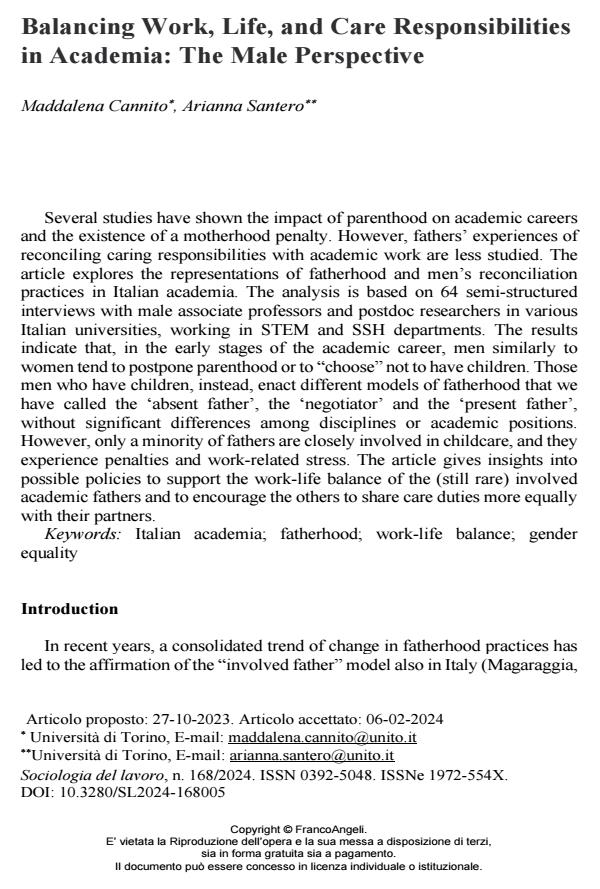Balancing Work, Life, and Care Responsibilities in Academia: The Male Perspective
Titolo Rivista SOCIOLOGIA DEL LAVORO
Autori/Curatori Maddalena Cannito, Arianna Santero
Anno di pubblicazione 2024 Fascicolo 2024/168
Lingua Inglese Numero pagine 24 P. 88-111 Dimensione file 270 KB
DOI 10.3280/SL2024-168005
Il DOI è il codice a barre della proprietà intellettuale: per saperne di più
clicca qui
Qui sotto puoi vedere in anteprima la prima pagina di questo articolo.
Se questo articolo ti interessa, lo puoi acquistare (e scaricare in formato pdf) seguendo le facili indicazioni per acquistare il download credit. Acquista Download Credits per scaricare questo Articolo in formato PDF

FrancoAngeli è membro della Publishers International Linking Association, Inc (PILA), associazione indipendente e non profit per facilitare (attraverso i servizi tecnologici implementati da CrossRef.org) l’accesso degli studiosi ai contenuti digitali nelle pubblicazioni professionali e scientifiche.
Several studies have shown the impact of parenthood on academic careers and the existence of a motherhood penalty. However, fathers’ experiences of reconciling caring responsibilities with academic work are less studied. The article explores the representations of fatherhood and men’s reconciliation practices in Italian academia. The analysis is based on 64 semi-structured interviews with male associate professors and postdoc researchers in various Italian universities, working in STEM and SSH departments. The results indicate that, in the early stages of the academic career, men similarly to women tend to postpone parenthood or to “choose” not to have children. Those men who have children, instead, enact different models of fatherhood that we have called the ‘absent father’, the ‘negotiator’ and the ‘present father’, without significant differences among disciplines or academic positions. However, only a minority of fathers are closely involved in childcare, and they experience penalties and work-related stress. The article gives insights into possible policies to support the work-life balance of the (still rare) involved academic fathers and to encourage the others to share care duties more equally with their partners.
Parole chiave:Italian academia; fatherhood; work-life balance; gender equality
- Rubbing salt in the wound of gender discrimination – a worldwide analysis of effectiveness of gender equality plans among post-doctoral researchers Giulio Marini, in Equality, Diversity and Inclusion: An International Journal /2025 pp.1
DOI: 10.1108/EDI-02-2025-0128 - Entre o Lar e a Lousa: A Dura Conciliação da Vida Acadêmica e da Maternidade Ariana Lana Morais Carvalho, Anne Cristine Fernandes Colombo, Beatriz da Cunha Gonçalves Leite, Carla Sabrina Antloga, in Saúde Coletiva (Barueri) /2025 pp.16416
DOI: 10.36489/saudecoletiva.2025v15i97p16416-16427
Maddalena Cannito, Arianna Santero, Balancing Work, Life, and Care Responsibilities in Academia: The Male Perspective in "SOCIOLOGIA DEL LAVORO " 168/2024, pp 88-111, DOI: 10.3280/SL2024-168005